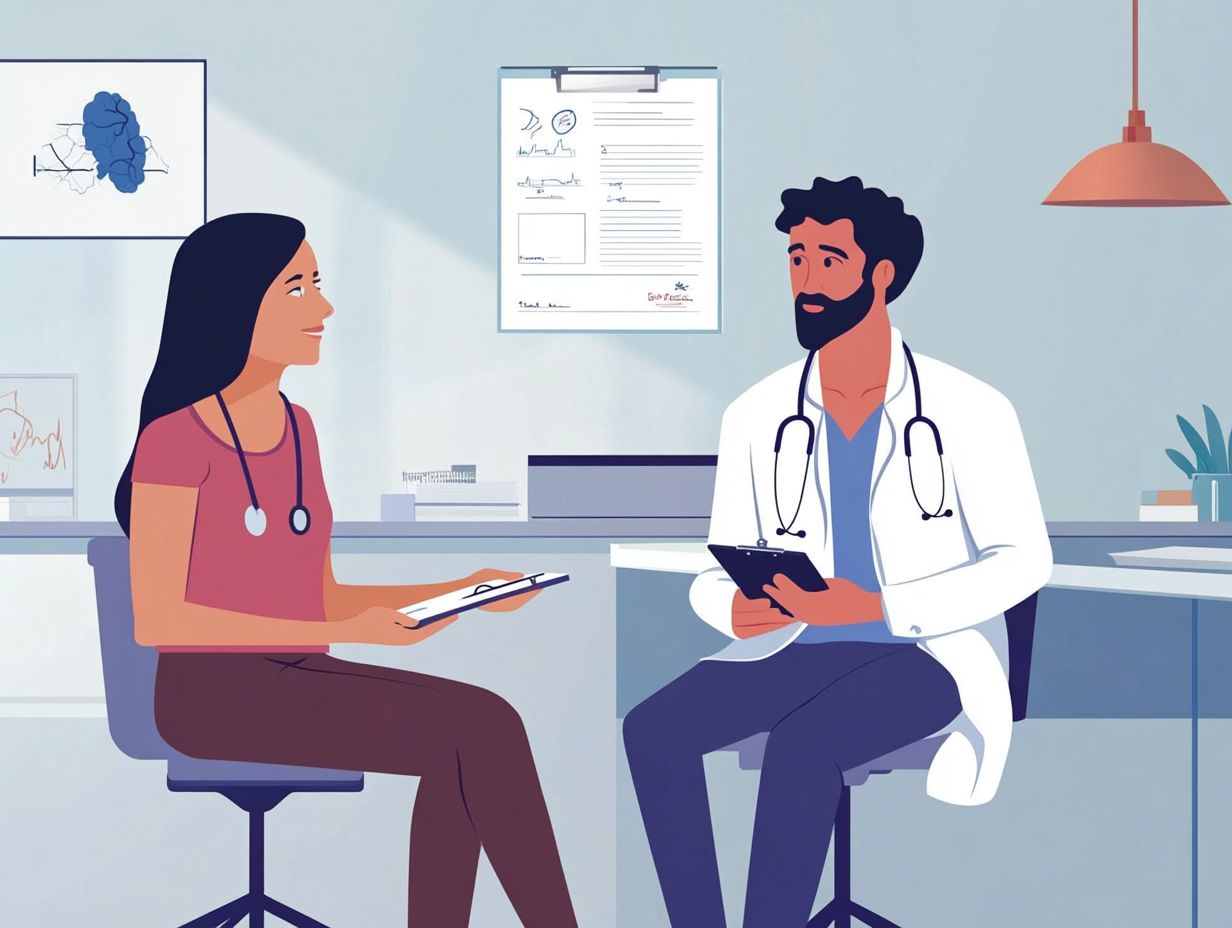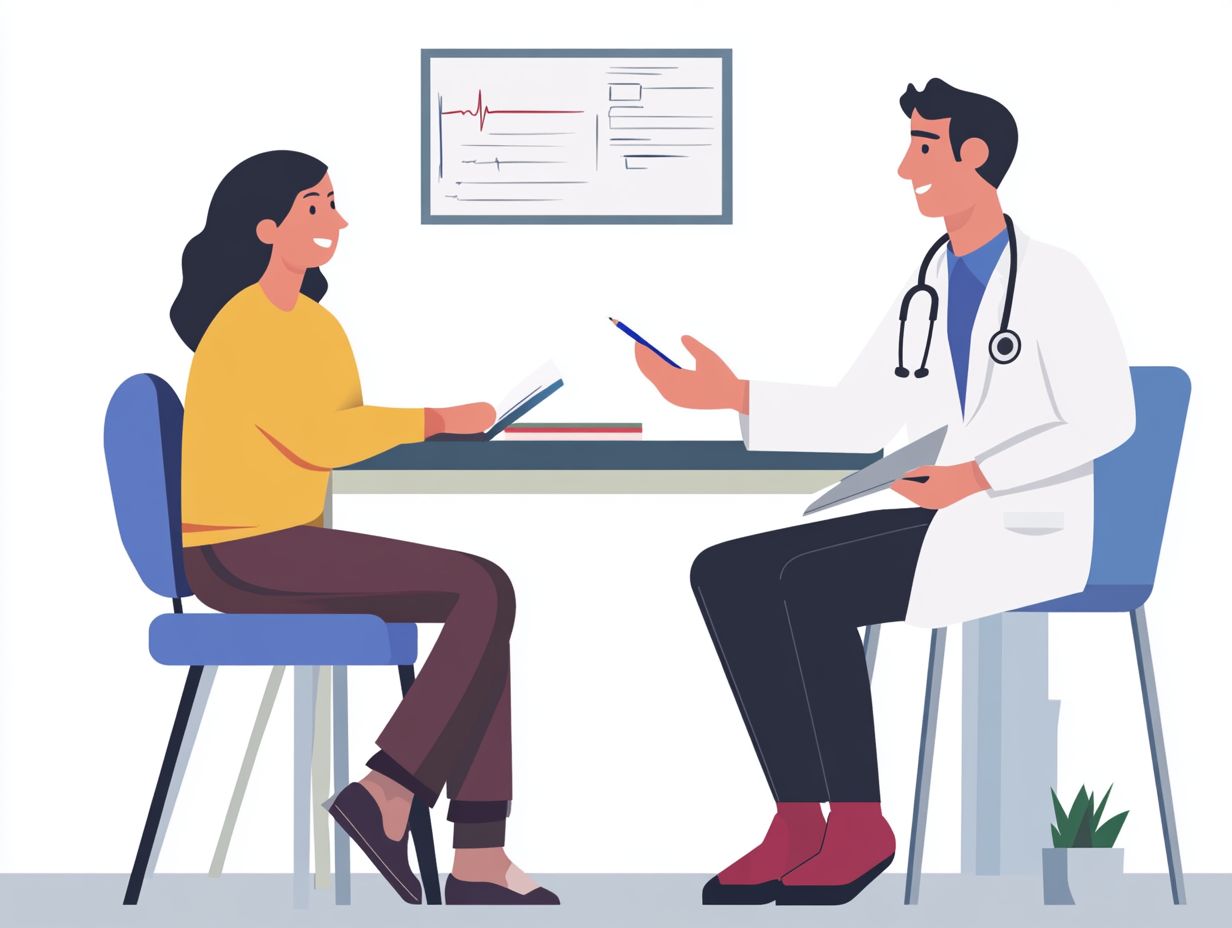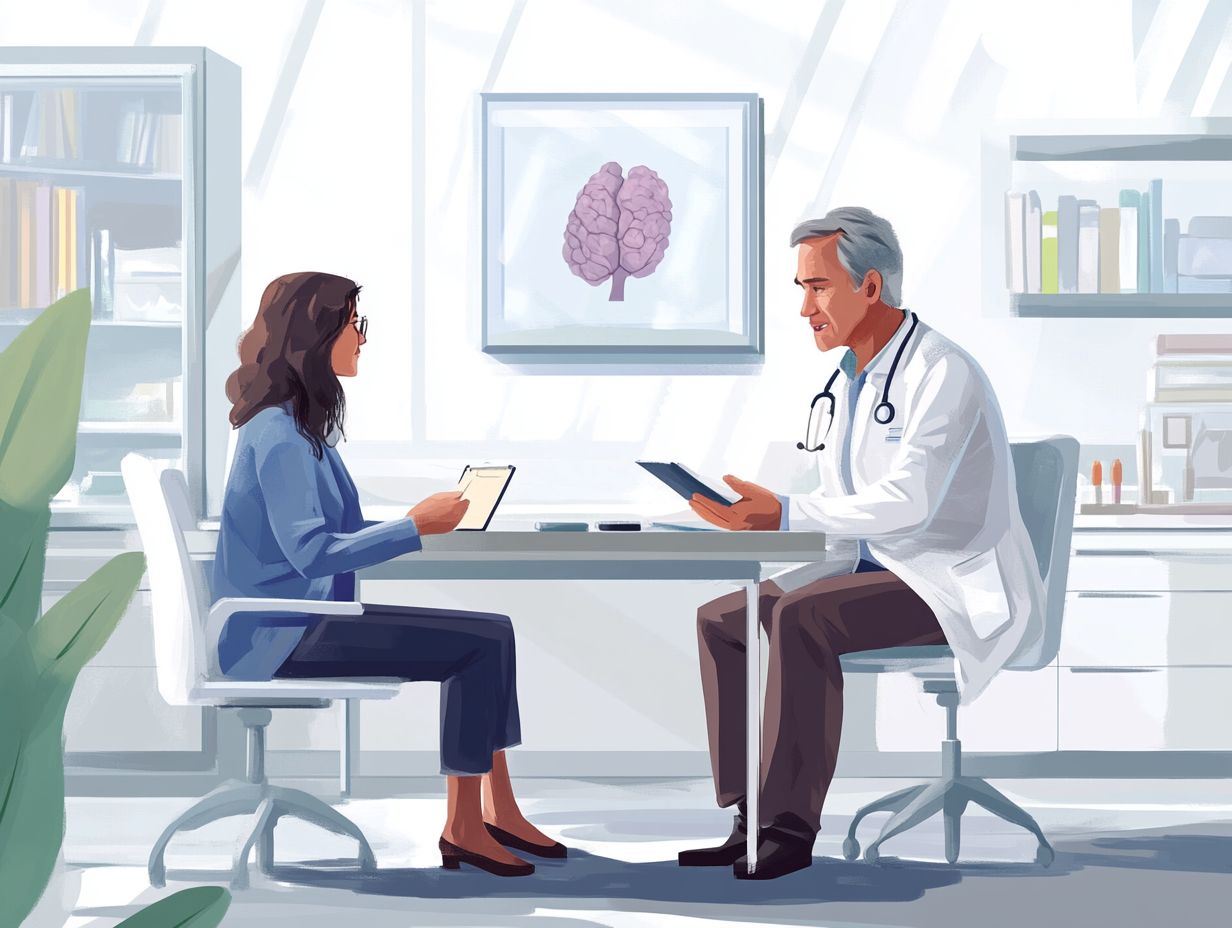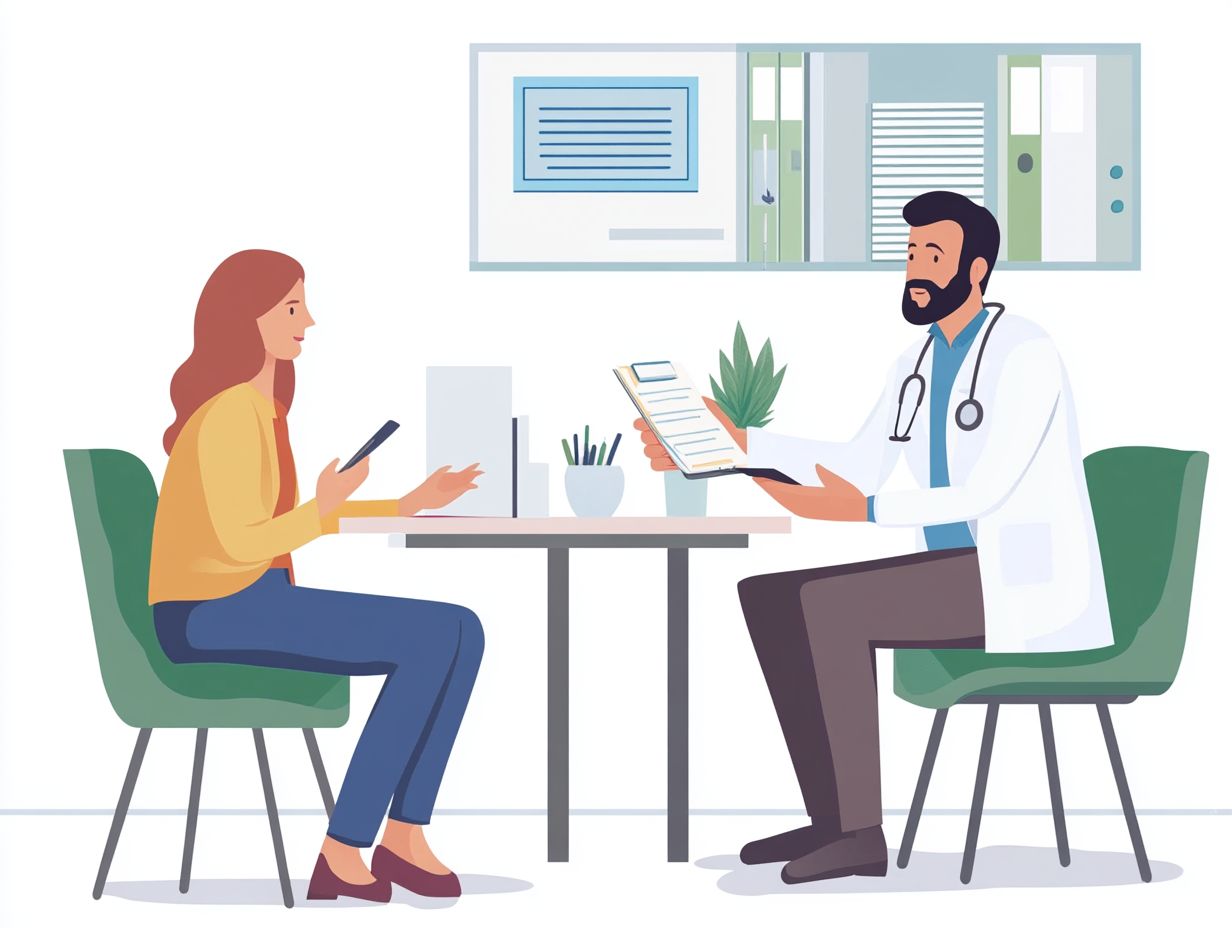When a cancer diagnosis is made, it is crucial to have comprehensive discussions with your oncologist to navigate your treatment journey effectively. Asking the right oncologist questions can empower you with the knowledge needed to make informed decisions about your cancer care.
Here are five essential questions to discuss with your oncologist:
- What Type of Cancer Do I Have? – Understanding the specific type of cancer, such as lung cancer or colon cancer, through diagnostic tests helps tailor appropriate treatment plans.
- What Stage Is My Cancer? – Knowing the cancer stage, determined by tumor size and spread, guides treatment options and prognosis.
- What Are My Treatment Options? – Explore advanced treatments like chemotherapy, immunotherapy, and radiation therapy to find a personalized approach.
- What Are the Potential Side Effects of Treatment? – Discuss chemotherapy side effects, as well as other potential side effects, and strategies for side effects management to maintain quality of life.
- How Will This Cancer Affect My Daily Life? – Address the physical and emotional impacts of cancer to develop coping strategies and garner support.
Addressing these questions with your oncologist ensures a proactive approach to cancer treatment and helps in planning your journey ahead with confidence and clarity. Consider seeking a second opinion from healthcare professionals, such as a medical oncologist or a surgical oncologist, for a comprehensive understanding of your options.
Key Takeaways:
1. What Type of Cancer Do I Have?

The type of cancer you have, whether it’s breast cancer or a different type of cancer, is determined through diagnostic tests, including imaging (such as MRI or CT scans) and biopsy.
Oncologists analyze these results to identify the specific type of cancer.
Identifying the correct type of cancer is essential for choosing the appropriate treatment.
2. What Stage Is My Cancer?
Determining the stage of your cancer involves evaluating the size of the tumor, the involvement of nearby lymph nodes, and whether the cancer has spread (metastasized).
Healthcare professionals use the TNM system, where T stands for tumor size, N for lymph node involvement, and M for metastasis.
Imaging tests, biopsies, and physical examinations assess these factors to classify the cancer stage.
The cancer stage informs treatment plans and prognosis.
3. What Are My Treatment Options?
Cancer treatment options include chemotherapy, immunotherapy, and radiation therapy, all of which are guided by your cancer care team.
Chemotherapy targets fast-growing cancer cells, immunotherapy boosts the immune system to combat cancer, while radiation therapy focuses on shrinking or eliminating tumors.
Consulting with a cancer care team ensures a personalized treatment plan tailored to individual needs.
4. What Are the Potential Side Effects of Treatment?
Potential side effects of cancer treatment include nausea, fatigue, hair loss, and changes in appetite.
Chemotherapy can cause these side effects, impacting daily activities.
Managing side effects involves:
- dietetary adjustments
- medication for nausea
- tailored exercise
- emotional support from support groups and therapy
5. How Will This Cancer Affect My Daily Life?

Cancer affects daily life by causing physical limitations, emotional challenges, and the need for patient support.
Physical symptoms like fatigue and pain can restrict activities.
Emotional effects include anxiety and isolation.
Support from family, friends, and healthcare professionals is essential.
Cancer influences daily routines and requires coping strategies.
What Are the Prognosis and Survival Rates for This Type of Cancer?
The prognosis and survival rates for cancer depend on the cancer stage, type, the patient’s overall health, and tumor characteristics. Consulting with your cancer care team can provide detailed insights tailored to your situation.
Survival rates vary; for example, early-stage cancers generally have higher survival rates compared to advanced-stage cancers.
Consulting with healthcare professionals provides personalized prognosis information based on individual cases.
How Can I Best Prepare for Treatment?
To best prepare for cancer treatment, understand your treatment options and address emotional and logistical aspects. Engaging with your cancer care team can offer guidance on preparation and expected treatment duration.
Consult your healthcare professionals and consider creating a detailed schedule for treatment appointments, follow-ups, and tests.
Organize a support system with family, friends, or support groups for encouragement and companionship.
Communicate openly with your healthcare team and address logistical issues such as transportation and financial considerations.
Are There Any Clinical Trials Available for My Type of Cancer?
Clinical trials for specific cancer types, such as those conducted at renowned centers like MD Anderson Cancer Center and UPMC Hillman Cancer Center, can be explored by consulting your oncologist or checking clinical trial registries like clinicaltrials.gov.
Hospitals such as UPMC Hillman Cancer Center or MD Anderson Cancer Center offer information about available trials.
These trials test new treatments and therapies tailored to particular cancer types.
What Lifestyle Changes Can I Make to Improve My Outcome?

Improving your outcome involves lifestyle changes like adopting a balanced diet rich in fruits, vegetables, and whole grains, engaging in regular physical activity, and prioritizing mental well-being through mindfulness and therapy. Additionally, staying informed on cancer research and advancements can empower you during your treatment journey.
Building a support system with family, friends, and support groups is also crucial for emotional resilience during treatment.
How Often Will I Need Follow-Up Appointments and Scans?
Follow-up appointments and scans are typically required every three to six months for the first few years after cancer treatment.
As time progresses and you remain cancer-free, the intervals between follow-ups may extend.
These visits generally include:
- Physical exams
- Blood tests
- Imaging studies to monitor for signs of recurrence
What Support Services Are Available for Cancer Patients?
Support services for cancer patients include emotional support, practical assistance, and educational resources, all integral to coping with cancer.
Services include:
- Individual counseling
- Group therapy
- Educational resources about diagnoses, staging cancer, and treatments
- Community connection opportunities
Institutions like UPMC Hillman Cancer Center provide these services to help patients manage stress, improve treatment outcomes, and connect them with leading experts such as Eric Singhi.
Frequently Asked Questions
What are the most important questions to ask your oncologist?

The 5 essential questions to ask your oncologist are: 1) What type of cancer do I have? 2) What stage is my cancer? 3) What are my treatment options? 4) What are the potential side effects of each treatment? 5) What is the prognosis for my cancer?
Why is it important to ask about the type of cancer and its stage?
Knowing the type and stage of your cancer can help you understand your treatment options and what to expect in terms of outcomes and side effects. It can also help you make informed decisions about your treatment plan.
What should I know about my cancer treatment options?
Your oncologist should discuss all available cancer treatment options for your specific type and stage of cancer. This may include surgery, chemotherapy, radiation therapy, immunotherapy, or a combination of these. It’s important to understand the risks, benefits, and potential side effects of each option, and how they align with your cancer treatment goals.
What are some common side effects of cancer treatment?
Side effects vary depending on the type of treatment and your individual health. Some common side effects of cancer treatment may include fatigue, nausea, hair loss, and changes in appetite. Your oncologist can provide more specific information about potential side effects for your treatment plan.
What questions should I ask about my prognosis?
It’s important to discuss your prognosis with your oncologist to understand the outlook for your cancer and how it may affect your life. You may want to ask about the expected length of treatment, chances of recovery, and any long-term effects of treatment.
What if I have additional questions or concerns?
It’s completely normal to have more questions or concerns after your initial consultation with your oncologist. Don’t be afraid to ask for more information or clarification. You may also want to bring a friend or family member to your appointments to help you remember important information and provide support.





